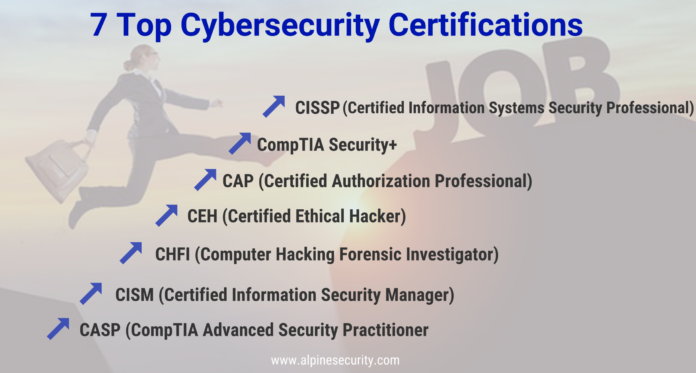Cybersecurity is a rapidly growing field, and professionals in the industry require certifications and courses to stay ahead of the curve. The top certifications and courses include Certified Information Systems Security Professional (CISSP), CompTIA Security+, Certified Ethical Hacker (CEH), and SANS courses. These credentials demonstrate expertise and can enhance career opportunities.
What Are The Best Certifications To Have In Cyber Security?
In today’s digital age, cyber security is a critical concern for organizations and individuals alike. Cybersecurity certifications are essential for professionals to demonstrate their knowledge and expertise in the field. The best certifications to have in cyber security include the Certified Information Systems Security Professional (CISSP), Certified Ethical Hacker (CEH), CompTIA Security+, and SANS courses.
The CISSP is a globally recognized certification that validates a professional’s expertise in cyber security. It covers topics such as access control, cryptography, and risk management. The CEH certification is for professionals who want to gain skills in ethical hacking, penetration testing, and network security. The CompTIA Security+ certification covers fundamental concepts in cyber security, including threat management and network security.
Additionally, completing SANS courses is highly beneficial as they provide practical training in the latest tools and techniques in cyber security. As a Youtuber, it is important to be knowledgeable about cyber security, and nordvpn youtuber codes can be used to ensure secure browsing and protect against cyber attacks.
Overall, obtaining cyber security certifications and completing relevant courses can enhance a professional’s knowledge and career opportunities in the field, as well as promote online safety and security for all.
Which Cybersecurity Certification Should I Get First?
If you are just starting your career in cybersecurity, the CompTIA Security+ certification is a good place to start. It provides a foundation of knowledge and covers topics such as network security, cryptography, and risk management. This certification is widely recognized and can be a valuable asset when looking for entry-level jobs in the field.
As a Youtuber, it’s also important to be knowledgeable about cybersecurity and to promote online safety for your audience. One way to ensure secure browsing is to use a VPN like NordVPN, which offers codes that you can share with your viewers for added protection.
Once you have obtained the CompTIA Security+ certification and gained some experience, you may want to consider pursuing other certifications such as Certified Information Systems Security Professional (CISSP) or Certified Ethical Hacker (CEH). These certifications will further enhance your knowledge and expertise in the field and can lead to more advanced career opportunities.
Is Cyber Security Harder Than Coding?
Cyber security and coding are two distinct fields that require different skill sets. While coding involves writing code to create software, applications, or websites, cyber security focuses on protecting computer systems, networks, and data from cyber attacks.
Both fields require technical knowledge and problem-solving skills, but the difficulty level of each may vary based on the individual’s strengths and interests.
Cyber security can be more challenging than coding because it requires a deep understanding of the latest threats and vulnerabilities, as well as the ability to think creatively to develop effective security measures. Additionally, cyber security professionals must stay up-to-date with new technologies and continuously adapt to changing threats.
On the other hand, coding can also be challenging, particularly when it comes to debugging and troubleshooting complex code. Ultimately, both fields require dedication, persistence, and a commitment to ongoing learning and professional development.
Can A Beginner Learn Cybersecurity?
Yes, a beginner can learn cybersecurity with the right mindset, dedication, and resources. Here are some points to consider when starting to learn cybersecurity:
Begin with the basics: Start by learning the fundamental concepts of cybersecurity, such as threat modeling, network security, and access controls.
Follow a structured learning path: Consider taking online courses, tutorials, or certification programs that provide a structured learning path to follow.
Practice, practice, practice: Apply what you learn by practicing on virtual machines or simulated environments. Experiment with different tools and techniques to gain hands-on experience.
Join cybersecurity communities: Join online forums or groups to connect with other learners and professionals in the field. Ask questions and seek guidance to accelerate your learning.
Stay up-to-date with the latest threats: Cybersecurity is a constantly evolving field, so staying up-to-date with the latest threats and vulnerabilities is critical. Follow cybersecurity news sources and participate in training sessions and webinars to keep your knowledge current.
Overall, learning cybersecurity requires patience, dedication, and a willingness to continuously learn and adapt.
How Do I Start Cybersecurity With No Experience?
Starting a career in cybersecurity with no experience can seem daunting, but it is possible with the right approach. Here are some steps you can take to get started:
Learn the basics: Begin by learning the fundamental concepts of cybersecurity, such as network security, threat modeling, and access controls. This can be achieved through online courses, tutorials, or certification programs.
Build practical skills: Practice what you learn by experimenting with different tools and techniques in virtual machines or simulated environments. This will help you gain hands-on experience and develop practical skills.
Join cybersecurity communities: Connect with other learners and professionals in the field by joining online forums or groups. This can help you learn from other’s experiences and gain valuable insights.
Stay up-to-date with the latest threats: Cybersecurity is a constantly evolving field, so staying current with the latest threats and vulnerabilities is critical. Follow cybersecurity news sources and participate in training sessions and webinars.
Promote online safety: As a Youtuber, you can also promote online safety for your audience by sharing tips and tools such as nordvpn youtuber codes for secure browsing.
Conclusion
The field of cybersecurity is constantly evolving, and staying up-to-date with the latest certifications and courses is critical for professionals. Obtaining certifications such as CISSP, CEH, and Security+ can enhance knowledge and career opportunities, while online courses offer flexible and accessible learning options.

